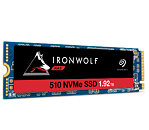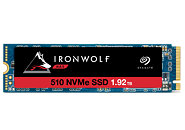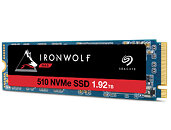- Joined
- Oct 9, 2007
- Messages
- 47,670 (7.43/day)
- Location
- Dublin, Ireland
| System Name | RBMK-1000 |
|---|---|
| Processor | AMD Ryzen 7 5700G |
| Motherboard | Gigabyte B550 AORUS Elite V2 |
| Cooling | DeepCool Gammax L240 V2 |
| Memory | 2x 16GB DDR4-3200 |
| Video Card(s) | Galax RTX 4070 Ti EX |
| Storage | Samsung 990 1TB |
| Display(s) | BenQ 1440p 60 Hz 27-inch |
| Case | Corsair Carbide 100R |
| Audio Device(s) | ASUS SupremeFX S1220A |
| Power Supply | Cooler Master MWE Gold 650W |
| Mouse | ASUS ROG Strix Impact |
| Keyboard | Gamdias Hermes E2 |
| Software | Windows 11 Pro |
Seagate Technology plc, a world leader in data solutions, today announced the latest in high-performance solutions for multi-user NAS environments, adding to their award-winning IronWolf SSD product line. Seagate's IronWolf 510 is an M.2 NVMe SSD with caching speeds of up to 3 GB/s for NVMe-compatible systems and is ideal for creative pros and business NAS needing 24x7 multi-user storage that is cache enabled.
The IronWolf 510 SSD meets leading top NAS manufacturer requirements of one drive write per day (DWPD), allowing multi-user NAS environments to do more with their data with lasting performance. The IronWolf 510 SSD is reliable with 1.8 million hours mean time between failures (MTBF) in a PCIe form factor, two years of Rescue Data Recovery Services, and a five-year limited warranty. IronWolf Health Management helps analyze drive health and will soon be available on compatible NAS systems.



"We are the first to provide a purpose-built M.2 NVMe for NAS that not only goes beyond SATA performance metrics but also provides 3x the endurance when compared to the competition. This meets the required endurance spec of one DWPD which our NAS partners expect for their customers," said Matt Rutledge, senior vice president, devices. "Because of such high endurance, our customers are getting a tough SSD for small business and creative professional NAS environments."
Meiji Chang, General Manager of QNAP Systems, Inc., commented, "We're thrilled to see new additions to Seagate's solid-state drive line for NAS which caters specifically to SSD requirements in the network storage segment enhancing performance and endurance. This enables QNAP to build more performance-driven and reliable systems and applications, including all-flash arrays, on which our users can rely."
The IronWolf 510 SSD PCIe Gen3 x4, NVMe 1.3 is available in 240 GB, 480 GB, 960 GB, and 1.92 TB capacities and is compatible with leading NAS vendors to provide server storage for small and medium-sized businesses and creative professionals that use NAS.
Combine IronWolf Hard Drives with IronWolf SSD's and benefit from ultra-high capacity, ultra-high endurance, and high-speed caching.
Available now, Seagate's IronWolf 510 SSD retail for:
View at TechPowerUp Main Site
The IronWolf 510 SSD meets leading top NAS manufacturer requirements of one drive write per day (DWPD), allowing multi-user NAS environments to do more with their data with lasting performance. The IronWolf 510 SSD is reliable with 1.8 million hours mean time between failures (MTBF) in a PCIe form factor, two years of Rescue Data Recovery Services, and a five-year limited warranty. IronWolf Health Management helps analyze drive health and will soon be available on compatible NAS systems.



"We are the first to provide a purpose-built M.2 NVMe for NAS that not only goes beyond SATA performance metrics but also provides 3x the endurance when compared to the competition. This meets the required endurance spec of one DWPD which our NAS partners expect for their customers," said Matt Rutledge, senior vice president, devices. "Because of such high endurance, our customers are getting a tough SSD for small business and creative professional NAS environments."
Meiji Chang, General Manager of QNAP Systems, Inc., commented, "We're thrilled to see new additions to Seagate's solid-state drive line for NAS which caters specifically to SSD requirements in the network storage segment enhancing performance and endurance. This enables QNAP to build more performance-driven and reliable systems and applications, including all-flash arrays, on which our users can rely."
The IronWolf 510 SSD PCIe Gen3 x4, NVMe 1.3 is available in 240 GB, 480 GB, 960 GB, and 1.92 TB capacities and is compatible with leading NAS vendors to provide server storage for small and medium-sized businesses and creative professionals that use NAS.
Combine IronWolf Hard Drives with IronWolf SSD's and benefit from ultra-high capacity, ultra-high endurance, and high-speed caching.
Available now, Seagate's IronWolf 510 SSD retail for:
- $119.99 - 240 GB
- $169.99 - 480 GB
- $319.99 - 960 GB
- $539.99 - 1.92 TB
View at TechPowerUp Main Site




